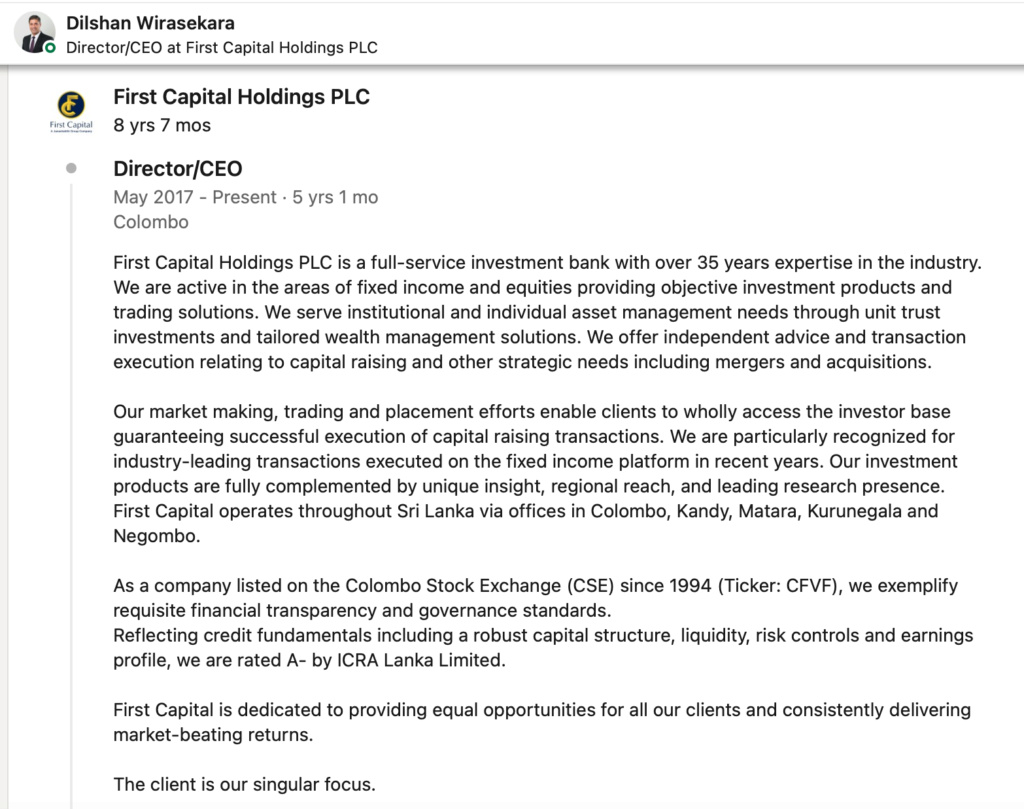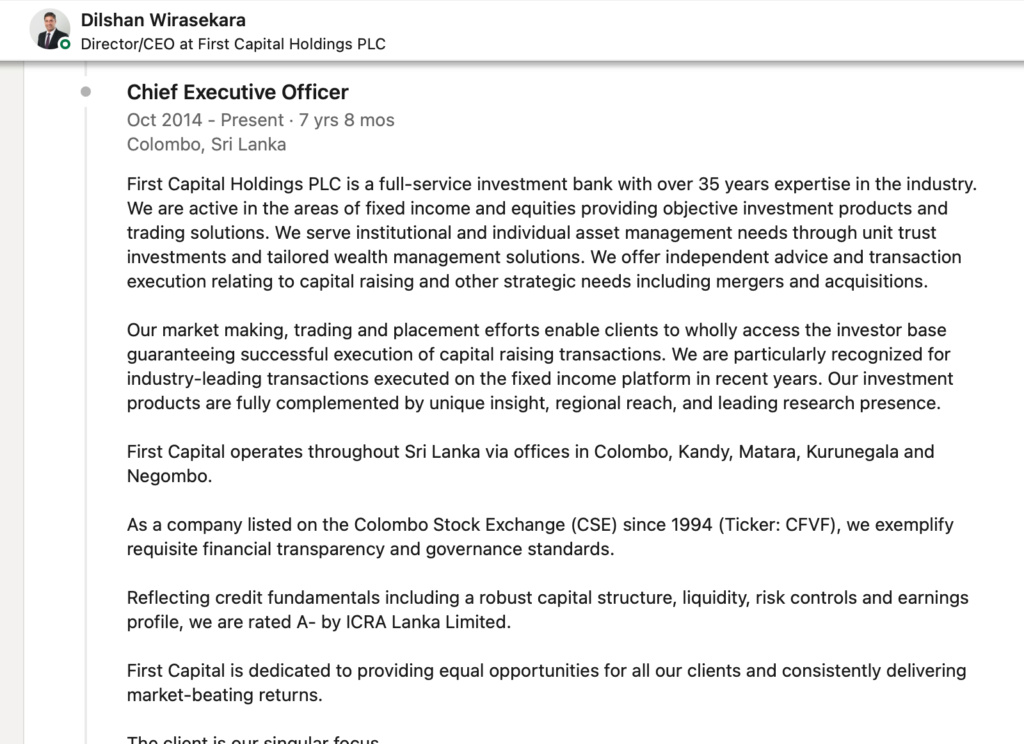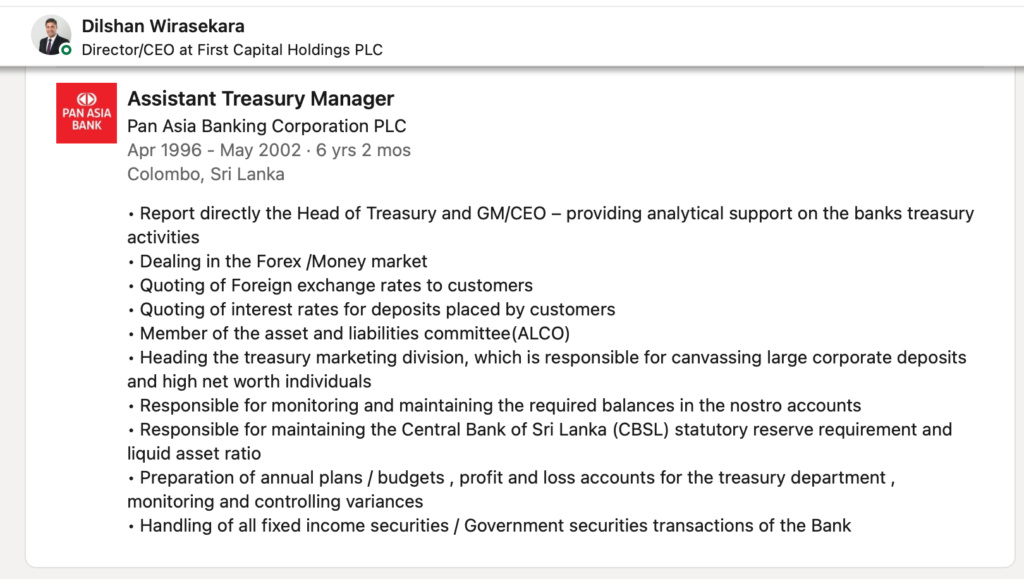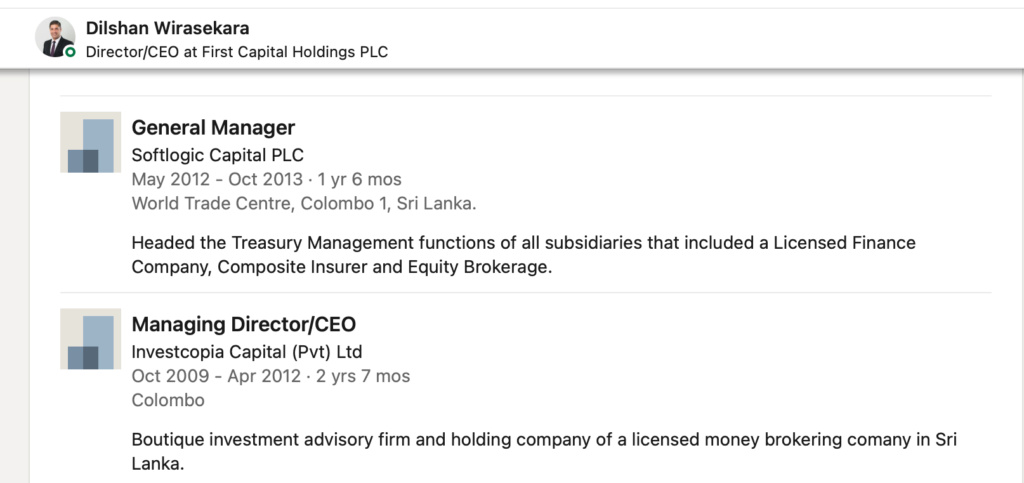DUMITH FERNANDO OUTLINES THE OUTLOOK FOR EQUITIES AND THE CSE IN 2022
THE CHAIRMAN OF THE COLOMBO STOCK EXCHANGE SHARES INSIGHTS ABOUT A RECORD 2021 AND WHAT INVESTORS CAN EXPECT.
Dumith Fernando, Chairman of the Colombo Stock Exchange (CSE), discusses equities’ stellar performance in 2021 and the exciting prospects for the capital market in 2022.
How has 2021 been for the equities market, and how has the CSE performed in 2021?
We are very fortunate that 2021 has been a record-shattering year for the Colombo Stock Exchange (CSE). With corporate earnings at record levels and unprecedented investor interest in the stock market as negative real interest rates prevailed, the CSE surpassed several milestones in 2021. Firstly, we saw record capital raising by companies at the CSE. Secondly, performance indicators of the CSE such as market capitalisation, and total and daily average turnover recorded the highest ever values in 2021. The benchmark All Share Price Index (ASPI) recorded a market return of 80%, which is the highest return recorded since 2010. Compared with the market indices of the Asia-Pacific region, the ASPI consistently maintained its status as the highest yielding index. The S&P SL20 index also recorded a return of over 60%, which is the highest ever recorded. We also had record numbers of investor participants at the CSE.
Despite the market having risen so much, our valuations are still attractive. It is below historical averages – at least 10-12% below the 10-year average. But more interestingly, it is about 30% lower than during previous depressed interest rate periods. Additionally, the Sri Lankan stock market is undervalued in relative terms by 20-25% compared to other emerging or frontier markets.[/size]
How have equities performed against other asset classes?
Like most markets worldwide, Sri Lanka was in a low-interest-rate regime. The environment of very low real interest rates made alternative investments such as fixed-income much less attractive than equities to investors. Many of them gravitated to the stock market in 2020/21, leading to a record number of investors participating in the equities market now. Two years ago, we had about 12,000 investors in the stock market from Sri Lanka. This year we have quintupled that to over 60,000. The overall market activity also accelerated, and total trades per day increased significantly. In 2021, we recorded an extraordinary average of over 32,000 trades daily!
Tell us about some of the capital market development initiatives, products and strategies, their progress thus far and plans for the future?
For the longest time, the CSE had been a market for shares and debentures only. But in 2020, we put a strategic plan in place where we wanted to increase options for investors so that you could invest across asset classes while also managing risk better.
We introduced dollar listings or multi-currency listings, so now local companies, particularly exporters and Sri Lankan multinationals who require foreign currency capital can access that through the CSE. We also introduced REPO trading on debt securities, which has already started.
Another significant market infrastructure development in 2021 was the introduction of Delivery vs Payment (DVP) which puts us on par with global exchange best practice and mitigates settlement risk.
Over the next few months, we hope to introduce some exciting new products, including stock borrowing, lending, and short-selling. We will also launch gold-based traded investment products, ETFs (Exchange Traded Funds) and structured warrants. We are keen to complete the demutualisation of the CSE by 2023 and hope the government will fast track the necessary legislation.
Another significant development has been the Digitalization Drive of the stock market, initiated by the Securities and Exchange Commission of Sri Lanka (SEC) and the CSE. The second phase of the digitalization of the stock market was launched in 2021, adding a wealth of new technological advancements in terms of the CSE web, social media, and mobile app. The latest features of the mobile app include CDS eConnect and MYCSE, benefiting a wide range of stakeholders in the stock market, enabling a productive user experience with increased efficiency. Our digitalisation efforts have brought a new generation of investors into Sri Lanka’s capital market.
The CSE had several IPOs during the past year. Can you tell us about these?
Providing a venue for efficiently channelling excess savings into companies that require capital is one of the most critical economic functions of a stock exchange. Over the last few years, the CSE saw vigorous debt capital raising via corporate debenture issues while equity listing experienced a lean period. That changed in 2021. As of November 2021, we have raised capital worth Rs124 billion via 47 listings. We have raised over Rs12 billion via equity IPO listings, the highest ever capital raised via equity listings since 2011. Every single equity listing had been oversubscribed on opening day. We have also seen listings from companies of different sizes and diverse industries entering the market. That proved that the value proposition of the CSE to private sector businesses is broad-based and not limited to a privileged few.
There is a strong case for companies to list on the CSE, but are there reasons it would be especially so this year/2022?
Increasing the number of companies listed on the exchange was one of the CSE’s key strategic objectives for 2021, and we have made steady progress on this front. In 2021, we made improvements to expedite the listing approval process and established a single window within the CSE for companies wishing to list. Had we not done this, it would have been practically impossible to facilitate all the listings by the end of 2021. As discussed before, we are introducing diverse avenues to list, catering to different companies and requirements, such as multi-currency listing, the listing of shares by special-purpose acquisition companies, green bonds, and more. We also made strong representations, with the support of the SEC, to bring about tax incentives for companies wishing to list, in the government budget of November 2020. That prompted several companies to come to market in 2021.
As companies revive from the Covid pandemic and are searching for avenues to grow with new objectives, companies must turn to viable sources for long term capital raising. So, with the growing number of investors and funds available at the CSE and the global and Sri Lankan recognition that listed companies are gaining, this is an ideal time to join the stock exchange for companies to meet capital requirements and leverage all the benefits, including the recognition, of being listed.
Will equities still be a compelling asset class in 2022? How should investors approach investing in stocks?
We now have a stock market that is a real marketplace with large numbers of capital and investors. As we continue to experience a negative real interest rate environment in 2022, there are few better performing asset classes than listed equities that deliver a balance of returns and value appreciation while also being liquid. With the infrastructural, technological and legislative improvements, CSE has become a venue where all stakeholders can conduct business with convenience and ease. With diverse companies still expecting to list on the CSE, the market offers opportunities for investors of all interests and scales. At the same time, investors need to place a premium on investing with knowledge. Investors need to acquire credible and reliable information and market awareness from trusted and experienced sources while understanding their investment capacity and return expectations.
https://www.echelon.lk/dumith-fernando-outlines-the-outlook-for-equities-and-the-cse-in-2022/

 would enable you to enjoy an array of other services such as Member Rankings, User Groups, Own Posts & Profile, Exclusive Research, Live Chat Box etc..
would enable you to enjoy an array of other services such as Member Rankings, User Groups, Own Posts & Profile, Exclusive Research, Live Chat Box etc.. 
 Home
Home
























